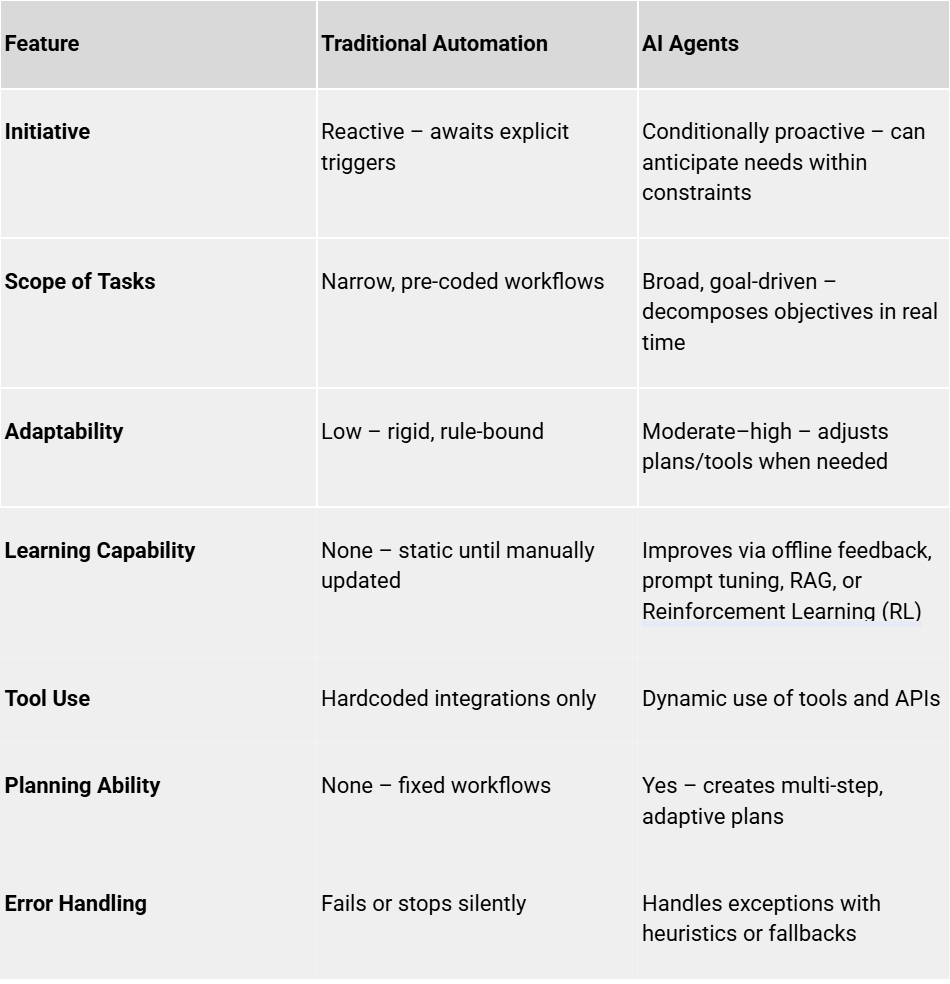Why AI Agents Are More Than Just Automation


This is the first edition of our new series exploring the rise of AI Agents Automation — autonomous, goal-driven systems that are changing how work gets done. In this issue, we explore what makes agents more than just the next wave of automation.
Across industries – from the precision of manufacturing to the nuance of customer service, a profound technological shift is taking root: the rise of the AI agents. This isn’t just the next step in automation; it’s a shift toward intelligent systems that can plan, execute tasks, and adapt over time to achieve complex goals—often with reduced human intervention, though still within defined guardrails. For businesses seeking efficiency, innovation, and a competitive edge, the question isn’t whether AI will transform operations, but rather why AI agents are the next inevitable frontier.
Beyond Basic Automation: The AI Agents Automation Edge
The core appeal of AI agents lies in their ability to transcend rigid, pre-programmed instructions. Traditional software automation excels at repetitive tasks with clearly defined rules (think assembly line robots or scripted workflows). But the real world is filled with ambiguity, unforeseen variables, and evolving objectives – precisely where AI agents shine. Powered by advanced large language models and complementary AI components, agents can process diverse inputs—such as text, images, or sensor data—by integrating with specialized models like multimodal transformers or time-series analyzers. They can formulate multi-step strategies, use external tools, and evaluate their outputs to improve over time. In short, they bring adaptability and reasoning into process automation.
Unlike reactive systems that wait for explicit commands, AI agents—especially when powered by predictive analytics and task-specific data—can anticipate needs and take proactive action.
For example, imagine an AI agent monitoring a complex supply chain: it could detect indicators of a potential disruption—like a delayed shipment or weather alert—and recommend alternative logistics routes before a human intervenes. In manufacturing, an agent might analyze real-time production data and flag anomalies or suggest resource reallocations, helping operators adjust before quality issues escalate. While these scenarios remain early-stage in practice, they reflect the expanding potential of agents to support decision-making beyond the limits of rule-based automation, which typically halts or escalates when exceptions occur.
While some AI agents include feedback mechanisms, most production systems today don’t self-learn in real time like humans or adaptive control systems. Instead, they rely on offline processes—fine-tuning, prompt optimization, or refreshing retrieval sources—to improve. Although in well-defined environments, agents can be engineered to utilize historical results or user feedback to fine-tune future responses—but these feedback loops require meticulous design and monitoring. Over time, this approach enhances relevance and reliability, especially in domains with swiftly shifting contexts.
How Agentic Systems Outpace Conventional Automation

Consider how many and how complex tasks organizations face today. Whether it’s reviewing piles of legal documents, routing deliveries in real time, spotting tricky fraud patterns, or customizing customer experiences—the human touch is essential, but it often slows things down. AI agents are here to help—not to replace people, but to boost what we can do and give us time for more creative, high-impact work.
“As an AI engineer, I’ve seen that AI agents truly shine in scenarios with open-ended problems – those without a fixed step-by-step solution,” explains Coy Cardwell, Principal AI Engineer at First Line Software. “For instance, in data analysis and complex problem-solving, agents can retrieve pertinent information through diverse queries, significantly cutting down the time analysts spend on information gathering.”
Coy Cardwell
AI Principal Engineer, First Line Software
By taking care of the heavy lifting—digging through data and making routine decisions—agents free experts to focus on strategy, innovation, and relationships: the areas where humans make the biggest impact.
Specialized software development companies like First Line Software are leading the charge in implementing agentic solutions across various domains. Our work includes developing a Multimodal Agentic System that goes beyond static information retrieval – empowering AI to plan, iterate, and take action based on evolving context, which significantly enhances accuracy and adaptability in knowledge-intensive tasks. We’ve also built an AI-Powered Sales Assistant to streamline sales operations (helping reps quickly locate relevant case studies and even auto-generate documents), as well as a Generative AI Customer Service Assistant that provides 24/7 support by instantly retrieving information and answering complex customer inquiries in a conversational manner. These real-world implementations demonstrate the practical impact of AI agents across diverse business functions – from sales and marketing to customer support and beyond.
To learn how agentic AI systems could be deployed and managed within your own operation, reach out to us at First Line Software. We’re happy to discuss practical steps to pilot these technologies and integrate them into your business in a safe, effective way.

